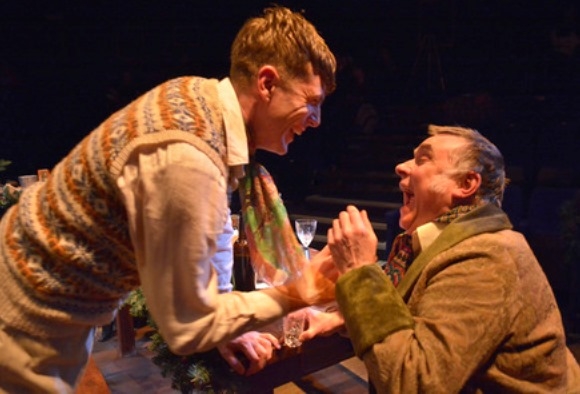Twelfth Night (Octagon Theatre, Bolton)

© Ian Tilton
The wishful notion that Shakespeare spent part of his lost years in Lancashire inspires the setting for The Octagon’s new production of Twelfth Night.
In a 1930’s stately home mournful aristocrat Olivia (Natalie Grady) refuses all suitors but is attracted to the page sent by Duke Orsino (Michael Shelford). This is unfortunate as the page is actually Viola (Rosie Jones) a woman in disguise who, while looking for her lost twin, has fallen in love with the Duke. Meanwhile below stairs the kitchen staff plan revenge against the scornful butler Malvolio (Chris Villiers).
Director David Thacker subtly changes the tone of the play from farcical comedy to bittersweet romance with a dash of social comment. The atmosphere throughout is reflective, with Ciaran Bagnall’s lighting shading the stage in muted autumn colours, and the humour gentle rather than bawdy. The restraint in the first Act makes the broader comedy in the second all the more successful.
Much of the social awareness in the production is conveyed through the accents and speech patterns adopted by the cast. Jessica Baglow and Ian Blower (as, respectively, the kitchen maid Maria and Sir Toby Belch) show the working class roots of their characters with strong regional accents. Michael Shelford adopts the vaguely sympathetic tone that one associates with Royalty.
Thacker makes excellent use of Bagnall’s ambitious split-level stage design to clarify the story and move it along at a rapid pace. The ground floor level features the kitchen and Olivia’s reception room. The cast remain on stage and in character throughout even when not featured in the central scene. In the background Malvolio kneels in prayer and Olivia languishes on a sofa. The upper level is the Duke’s music room in which Shelford plays live piano and delivers his melancholy opening speech. At the same time the shipwreck that separates the twins takes place on the lower level.
This is a production that allows few illusions. Blower's Sir Toby Belch is as much a predatory and pathetic drunk (first seen vomiting) as the spirit of revelry. Notably Thacker denies him the dignity of marriage to Maria. Mawgan Gyles turns Sir Andrew Aguecheek into a toff slumming amongst the lower class. But the callowness that Gyles brings to the youth reveals him to be terribly vulnerable to exploitation.
Villiers achieves the very difficult task of making an unlovable character sympathetic. He quickly forms a strong relationship with the audience delivering a spellbinding monologue in an intimate chatty manner that draws in the listeners and makes them confidants. As a result Malvolio becomes not a pompous ass who gets his comeuppance but a lonely man who, heartbreakingly, believes dreams that he never dared to articulate have come true only to find that it is a cruel jest.
The love story elements in the play emerge gently with Viola and Orsino sharing their mutual passion for music.
Twelfth Night is such a popular play that it can easily be perceived as safe option for theatre companies and become over-familiar to audiences. The Octagon shows how, by taking a few chances, it is possible to offer a refreshing new perspective and achieve a great success at the same time.
Twelfth Night is at the Octagon Theatre until 22 March.










